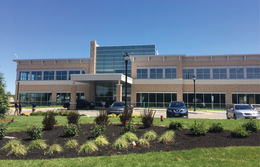
Preventative health screenings save lives, and Jefferson Outpatient Imaging makes it easy and convenient to schedule these noninvasive procedures at one of its many locations across South Jersey and the Greater Philadelphia area.
“If you wait until you feel bad, sometimes it’s too late to do anything about it, or at least too late to leave you in the same condition you’re in now,” Dr. Chris Roth explains.
Dr. Roth is chair of the department of radiology at Jefferson Health University Hospital, and stresses that these preventative health screenings can improve disease treatment with earlier diagnoses.
Jefferson‘s Department of Radiology is broken down into organ system subspecialties, offering the latest in preventative health screenings with state-of-the-art facilities and equipment. These divisions specialize in one system of the body—for instance, cardiothoracic, musculoskeletal, abdominal or neuroradiology—to provide more focus and expertise across the board.
Most preventative health screenings require prescriptions from primary care providers, but physicians only have so much time with a patient, Dr. Roth says, and things like screening discussions may “fall through the cracks.” This is why Jefferson recommends patients proactively speak to their doctors regarding their screening needs.
Low-Dose CT Lung Screening
“About 15 million Americans meet the guidelines to qualify for low-dose CT lung screening, but only 5 to 6% end up getting screened,” says Dr. Roth. “There are millions of people not getting screened.”
As the leading cause of cancer death in the U.S., lung cancer is often diagnosed in later stages due to this lack of preventative screening, making it more difficult to treat.
“There are certainly people who are going to develop lung cancer that would have been captured in screening. If you’re getting screened at least every year, you’re highly likely to not end up with metastatic disease,” Dr. Roth says.
Individuals qualify for a low-dose CT lung screening if they:
- Are between the ages of 50 and 80 years
- Have an at least 20 pack-year smoking history
- Are a current smoker or quit within the past 15 years
Screening is available at six Jefferson Outpatient Imaging centers, including two in New Jersey. Most insurance plans cover screening; the self-pay price is $150.
Cardiac CT Calcium Scoring
“A lot of people are getting referred more often for calcium scoring,” Dr. Roth notes.
This CT scan of the heart calculates a patient’s risk of developing coronary artery disease. The noninvasive preventative screening is recommended for patients older than 40 years with a family history of heart attacks and risk factors including:
High cholesterol
- Diabetes
- High blood pressure
- Smoking
- Overweight or obesity
Cardiac CT calcium scoring is convenient, available at both Jefferson Outpatient Imaging New Jersey locations and the Navy Yard. The cost is a flat fee of $129.
3D Digital Mammography
The American College of Radiology and Society of Breast Imaging recommends people 40 and older get annual screening mammograms. According to the ACR, breast cancer mortality has dropped by 40% since 1990, largely due to the increase in preventative screenings.
Jefferson offers evening and weekend hours for 3D digital mammograms, also called breast tomosynthesis, at three locations, including in Washington Township. For those who have their last mammogram at a different facility, Jefferson will assist in obtaining previous records.
CT Virtual Colonoscopy
While CT virtual colonoscopy is a minimally invasive procedure that does not require sedation or anesthesia, it is still considered as accurate as a conventional colonoscopy at finding tumors and polyps. The virtual scan gives a clear view of the inside of the colon with a 3D image.
Jefferson recommends that individuals 50 years and older should talk to their doctor about whether they would benefit from this preventative screening.
“There’s hardly any risk with a CT virtual colonoscopy,” explains Dr. Roth. “Even if you feel fine or don’t feel anything, it’s worth it to get this annual screening.”
DEXA Bone Density Scan
Dr. Roth calls the DEXA Bone Density Scan “the easiest, most simplistic study we do. It measures the bone density using X-ray technology. We have a gigantic database to compare it to. We know exactly how dense your bones should be, and we can tell how far away you are from your age-controlled peers.”
The DEXA scan can provide helpful details regarding osteoporosis risk and, further, can determine the likelihood of fracture over the next 10 years. Most insurance plans, including Medicare, cover a DEXA scan every two years starting at age 65.
“It’s an overall diagnosis of your bone health,” Dr. Roth explains.
Prioritizing the Patient Experience
Radiologists at Jefferson Outpatient Imaging provide noninvasive preventative health screenings at one of its convenient outpatient locations, including in Marlton and Washington Township in New Jersey and six Pennsylvania facilities. There are often same-day and next-day appointments available, as well as evening and weekend hours for convenience.
Jefferson Outpatient Imaging
Serving South Jersey
(215) 503-4900
JeffersonHealth.org/JOI












